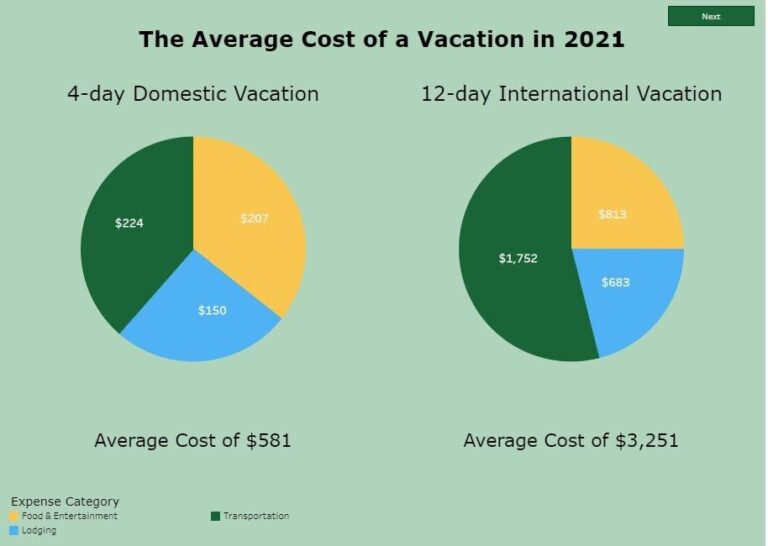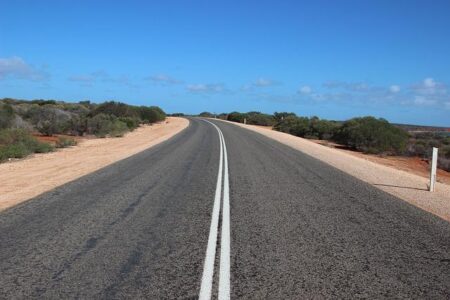As summer travel plans take shape, understanding the true cost of a vacation becomes essential for budget-conscious travelers. A recent report from Bankrate breaks down the average expenses associated with a typical getaway, covering key categories such as transportation, food, entertainment, and additional costs often overlooked. This comprehensive analysis offers valuable insight into how much Americans are spending to unwind, helping readers make informed decisions as they plan their next trip.
Average Transportation Expenses Shaping Vacation Budgets
Transportation costs often make up the largest chunk of vacation spending, directly influencing how travelers allocate their budgets. Depending on the destination and mode of travel, expenses can vary dramatically. Airfare remains the most significant expense for many, particularly for international trips, with average round-trip tickets ranging between $350 and $600. Conversely, road trips tend to be more economical, though gas prices, tolls, and vehicle maintenance add up. For those opting for trains or buses, affordability and convenience factor heavily into budget decisions, offering flexible alternatives without the premium price tag.
When considering transportation, it’s critical to factor in ancillary costs beyond the ride itself. This includes parking fees, airport transfers, baggage charges, and local commuting such as taxis or rideshares. Travelers increasingly weigh these secondary expenses in comparison to the initial ticket price, which can shift the total cost significantly. The following table highlights average transportation-related costs for a typical week-long vacation:
| Transportation Type | Average Cost | Additional Fees |
|---|---|---|
| Domestic Flight | $400 | $50 (baggage & seat selection) |
| Road Trip (Gas & Tolls) | $150 | $30 (parking & maintenance) |
| Train Travel | $120 | $20 (local transit) |
| Bus | $80 | $10 (rideshare to/from stops) |
- Booking early can significantly reduce transportation expenses, especially with airlines and trains.
- Travel during off-peak times often results in lower fares and better deals.
- Transport packages or combined tickets can offer savings for local commuting and attractions.
Breaking Down Food Costs on the Road and How to Save
When traveling, food expenses can easily spiral out of control, often accounting for a substantial portion of a vacation budget. Dining out for every meal, especially at tourist hotspots, can lead to unexpectedly high daily food costs. However, travelers can significantly minimize these expenses by adopting strategic eating habits. Opting for accommodations with kitchen facilities allows for preparing simple meals, which can be both healthier and more economical. Another money-saving tip is to visit local markets and grocery stores, not only to enjoy authentic flavors but also to avoid inflated prices at restaurants in busy areas.
Smart travelers consider the following tactics to keep food spending in check:
- Pack snacks and light meals for day trips to avoid pricey convenience foods.
- Enjoy local street food, which offers affordable and delicious options.
- Take advantage of complimentary breakfasts whenever available at accommodations.
- Share larger portions between travel companions to reduce waste and cost.
| Meal Type | Average Cost (USD) | Savings Tip |
|---|---|---|
| Breakfast | $8 – $15 | Choose lodging with breakfast included |
| Lunch | $12 – $25 | Opt for affordable street food or markets |
| Dinner | $20 – $45 | Cook at your accommodation or share plates |
Entertainment Spending Tips for a Balanced Vacation Experience
Balancing fun and finance during your vacation is key to a stress-free getaway. Begin by prioritizing activities that offer the most value—look for local gems and free events rather than automatically opting for expensive tours or shows. Booking tickets in advance or during off-peak times can also yield significant savings. Additionally, consider group discounts or combo passes that bundle multiple attractions for less, helping to stretch your entertainment budget without sacrificing experiences.
Another smart approach is to allocate a daily entertainment budget, tracking expenses to avoid overspending mid-trip. Here are some practical tips to maximize your entertainment dollars:
- Seek out community events: festivals, street performances, and museum free days
- Use apps and deal sites: for last-minute discounts and exclusive offers
- Mix paid activities with inexpensive pastimes: hiking, beach days, or exploring local markets
- Travel during shoulder seasons: when prices are lower and crowds are thinner
| Entertainment Option | Average Cost | Saving Tip |
|---|---|---|
| City Museum Admission | $15 | Visit on free-entry days |
| Guided Tour | $40 | Book group tours online |
| Live Theater | $60 | Look for rush tickets |
Hidden Costs to Watch for When Planning Your Trip
When budgeting for a getaway, it’s easy to overlook expenses that quietly add up. Extra baggage fees on airlines, resort parking charges, and resort or city taxes can significantly inflate your total costs. Moreover, the commonly ignored expense of travel insurance or last-minute itinerary changes could catch you off guard. Even daily essentials — from bottled water to tip jars at cafes — accumulate quickly, turning what seemed like a straightforward trip into a far pricier affair.
To help visualize these potential financial traps, consider the table below outlining typical hidden costs encountered during travel:
| Hidden Expense | Estimated Additional Cost |
|---|---|
| Checked Baggage Fees | $30 – $60 per bag |
| Resort/City Taxes | 5% – 15% of lodging |
| Parking Fees | $10 – $25 per day |
| Travel Insurance | $50 – $150 total |
| Tips & Incidentals | Variable, $5+ daily |
Awareness and early planning for these add-ons can protect your wallet from surprises and allow for a more accurate vacation budget. Savvy travelers often allocate a buffer of 10-20% on top of their calculated expenses just to cover such side costs, easing the strain and ensuring a smoother, stress-free trip.
Closing Remarks
In summary, understanding the average costs associated with vacation—spanning transportation, food, entertainment, and additional expenses—provides valuable insight for travelers aiming to budget effectively. As detailed by Bankrate, these factors play a critical role in shaping the total expenditure of a trip, emphasizing the importance of careful planning to balance enjoyment with financial responsibility. Staying informed on these costs helps ensure that vacationers can make smarter choices, ultimately enhancing their travel experience while keeping expenses manageable.




